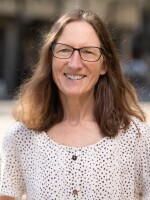Awareness, patience and some changes to public health policy will help us get through this pandemic, and be more prepared for the next one, according to one local expert. To cap off our year-long series on resilience, KLCC’s Karen Richards spoke with Lane County’s Chief Medical Officer, Dr. Patrick Luedtke.
Dr. Luedtke, let me start out by asking about something that’s gone well with public health in Lane County during the coronavirus pandemic.
“I think the first thing that pops into my head is the relationship between public health and the clinical entities in our community. If you look at, for example, the number of deaths in our county we’ve only had three, and I think a big part of that is because we’ve worked really closely with the clinical community to rapidly identify cases and isolate them, do contact investigation and identify their contacts and quarantine them, and get testing done quickly to understand what’s happening on the ground.”
Is some of that success because of things that you’d thought through and practiced?

“Every local health department has a preparedness coordinator. And we do what we call tabletop exercises, typically one a year sometimes two a year, looking at various potential scenarios of misery. And we enlist the supports and the participation of the entire clinical enterprise, ranging from Peace Health and McKenzie Willamette to the student health center at the University, to the ambulance, to our VA super clinic. And we try to run these scenarios and do a gap analysis to find where the gaps are.”
The pandemic has highlighted inequities: How can we help everyone be resilient?
“We’ve been talking for years about things ranging from access to clean air and clean water to persons who have economic challenges, and they really can’t either stay home because they have to put food on the table or they are in jobs that don’t offer things like sick leave, and they’re really stuck.”
“Prevention in general gets, in America, three pennies out of every dollar spent in health care, and that’s not the right amount. Now I’m not going to tell you the right amount is 17 cents of every dollar, I don’t think we exactly know, but it’s not three cents of every dollar.”

“The economy has been shut a bit, tax dollars are gonna be decreased for a time, it’s not like there will be tons of money flowing in to public health next year. Elected officials will have some tough decisions to make, but we need a plan to say, when things are a little better, we can’t let this happen again.”
How does mental health fit in to community resilience?
“You know, for far too long in medicine in America the head was not connected to the body. As a primary care doc for years, I can tell you that stress does strange things to the human body, when it’s severe stress. You can see people who have stress rashes, you can see people who have stress GI problems, you can see people who have stress cardiac disease, and the mental health / behavioral health space is really very important and we’re coming to realize that more and more, but as a country we’re not where we need to be yet.”
As a health authority, how important is a consistent message?
“Not only is there uncertainty and fear during a pandemic, especially with a novel organism that we haven’t seen before, but there’s limited bandwidth for all of us to make changes when we’re stressed. When it’s unknown, you have to cast a broad net, and when things then change, people think ‘did you really know the best way forward?’ and early on with a novel agent, you don’t know.”
So what happens when what’s understood about the coronavirus does change?
“I think it’s important for our communities to know that we are still learning things about this virus, and we do our best to share them in real time, when we learn something that’s definitive, we share it.”
Do you have any predictions about where we’ll be in six months?

“We’ll have vaccine in volume. We won’t have 330 million doses for every American yet, and also several of the vaccine candidates will require two doses. So looking forward six months we’ll have a fair number of people vaccinated with their first dose, maybe a few people getting their second dose. We hopefully will have schools in the springtime perhaps getting closer to assuming their historical schedules, and face to face instruction, and we will hopefully have more people going back to work, back to a reliable, more meaningful, more predictable schedule in their work life and in their social life.”
Dr. Patrick Luedtke, Chief Medical Officer for Lane County, thank you for your time.
"You’re most welcome."
Funding for KLCC’s Oregon’s Natural Resources and Resilience series is provided by the UO Wayne Morse Center for Law and Politics.





